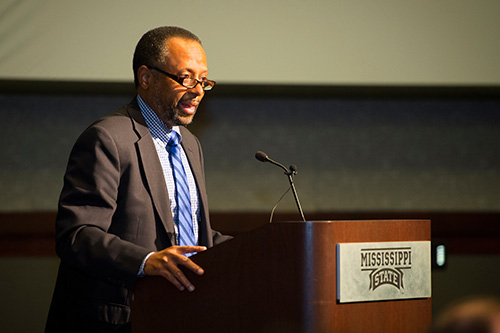Celebrating the past with an eye on the future: Black Studies Conference at MSU promotes diversity, education

Contact: Sasha Steinberg
STARKVILLE, Miss.—Through teaching, research and service, Mississippi State is preparing the next generation of problem solvers to make a positive impact on the state and beyond. During the university’s Black Studies Conference Nov. 5-6, faculty and administrators said the African American Studies program is celebrating 10 years of service and vowing to help further this mission in the years to come.
“Our African American Studies program fosters an environment that brings together faculty and students from across the university to ensure we are doing better for our students and for the future,” MSU Provost and Executive Vice President Judy Bonner told audience members Monday [Nov. 6] in the Colvard Student Union’s Bill R. Foster Ballroom.
“This conference provides an outstanding opportunity to reflect upon the past, present and future,” she added.
Following Bonner’s remarks, Don Shaffer, an associate professor of English who helped launch the AAS program at MSU, introduced the conference’s keynote speaker, Andrew W. Mellon Foundation President Earl Lewis.
A prolific author and former university administrator from Norfolk, Virginia, Lewis completed his undergraduate studies in history and psychology at Concordia College in Moorhead, Minnesota, and later earned a doctorate in history from the University of Minnesota.
During his presentation “African American Studies in the Age of Diversity,” Lewis discussed the important role of black studies programs in 21st century education.
“Black studies programs need to make sure they are training students how to be literate and analyze digital tools, so we all can be better consumers and also protect our own version of democracy,” Lewis said.
Providing an environment conducive to the dissemination of knowledge is another important role that institutions of higher learning—and African American or ethnic studies programs in particular—play in the world of academia, Lewis said.
“In the end, it comes back to the age-old issue that academics have been concerned with: How does the work that we’re crafting matter?” he said. “We need to be mindful of that question and mindful of the ability of each generation to not only build upon the work of the previous generation, but sometimes to deviate from it.”
Striving for excellence and working for a cause greater than oneself are major life skills that can be gleaned from a higher-education experience, Lewis said.
“Universities are all the more important in that light today because they can show students what the world looks like and teach them about choices that have been made in the past,” he said. “There’s a pathway to new choices, but that pathway will require a different way of organizing oneself relative to society and all of the privileges that come.”
Part of MSU’s College of Arts and Sciences, the African American Studies program offers courses on history, literature, politics and other aspects of black life and culture leading to an undergraduate minor in African American Studies.
Graduate students also can develop a concentration in AAS. Those who successfully complete a combination of course work, teaching assignments and community engagement will earn a certificate of completion, as well as a letter of recognition from the director of the program. The graduate program also offers an online diversity certificate.
For more information on MSU’s African American Studies program, visit www.aas.msstate.edu or follow on Twitter @MSStateAAS.
MSU is Mississippi’s leading university, available online at www.msstate.edu.
![Panelists for MSU’s “Contemporary Issues in African American Studies” discussion Prominent black studies scholars participated in a “Contemporary Issues in African American Studies” panel discussion Monday [Nov. 6] as part of Mississippi State University’s Black Studies Conference. From left to right, they include Mark Christian, professor and chair of the Department of Africana Studies at Lehman College - City University of New York; Maggie Hagerman, assistant professor in MSU’s Department of Sociology; activist Bernard Stringer, a San Francisco State University graduate who became the first student in the U.S. to earn a black studies degree; and activist Vernon Smith, former journalism and radio-TV-film production student and Black Student Union member at San Francisco State University. (Photo by Megan Bean)](/sites/www.msstate.edu/files/inline-images/Black_Studies_Conference-panel_full.jpg)